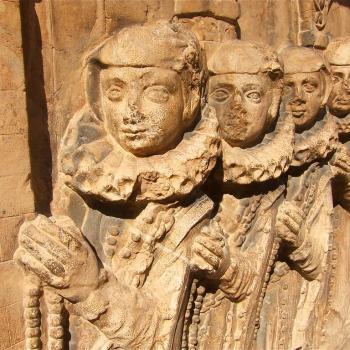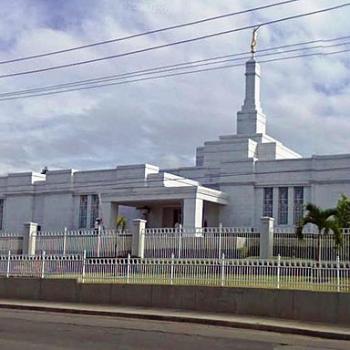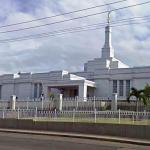
(Wikimedia CC; please click to enlarge and see it clearly.
The Church of Jesus Christ of Latter-day Saints has revealed the design for its soon-to-be-built temple in Kinshasa, the capital of the Democratic Republic of the Congo. Ground for the new temple will be broken on 12 February 2016, in a ceremony presided over by Elder Neal L. Andersen, of the Quorum of the Twelve Apostles.
As can readily be seen, the new temple will be very small and very modest:
http://www.ldschurchtemples.com/kinshasa/
Now, one might view the building of this temple as an effort to bring what Latter-day Saints believe to be the blessings of temple ordinances — the full blessings of the Restored Gospel of Jesus Christ — to a very poor people for whom travel to the already-existing African temples (in distant Ghana, Nigeria, and South Africa) has heretofore been effectively impossible, beyond their wildest imaginations or hopes. (Please — please — watch this moving six-minute photographic essay on the efforts made by Saints in Cameroon to reach the then-newly dedicated temple in Aba, Nigeria. Perhaps you too will be moved to contribute a little bit to the “Temple Fund” of the Church.)
The Democratic Republic of the Congo (formerly known as Zaire) is, by any measure, one of the poorest nations on the planet. In terms of per capita gross domestic product, the International Monetary Fund (2014) puts it at 186th on a list of 187 countries. The World Bank (2011-2014) ranks it as number 182 on a list of 185. The U.S. Central Intelligence Agency (1993-2014) puts it at 196 of 198. (See here for the listings.)
The more bitter and extreme critics of Mormonism typically like to describe temples as “revenue centers” for “LDS Inc.” The idea is that “the Corporation’s” requirement that those entering the temple be full tithe payers extorts money from “the sheeple,” thus allowing Church leaders, apparently, to wallow in sybaritic luxury. Or something of that sort. But this notion is difficult to maintain with regard to temples in Bolivia and Fiji and Nigeria, and it becomes simply impossible to believe for a temple in the Democratic Republic of the Congo. Kinshasa isn’t going to be a profitable source of money for the Church prior to unimaginable changes at the Second Coming, and perhaps not even then. Rather, it will always be, financially speaking, a net liability, a drain (and a big one).
So the narrative of the Church’s more bitter and extreme critics had to change. And it did.
The small size and simplicity of the pending temple in Kinshasa is, you see, an expression of contempt for black people.
(One might have thought that refusing to build a temple there at all — and refusing to build the three African temples already mentioned, and the two additional temples announced for Abidjan, in the Ivory Coast, and Durban, South Africa, and, for that matter, the temple announced for Port-au-Prince, Haiti — would have been a more obvious expression of such supposed contempt. But you’re not supposed to think so much.)
Imagine, though, the outcry that would have ensued if the Church had unveiled a massive, imposing, magnificent marble-clad structure to be constructed in such an impoverished place.
The point, of course, is that whatever the “Mormon Corporation” does is wrong. And not only wrong, but viciously so. The evil men who lead it have never had a sincere or humane thought in their entire lives, and their followers are, when they’re not malicious and hateful, merely brain-dead automatons.
This case is a revealing illustration of the sheer unreasonable hostility that some people — mostly apostate former members, I suspect — harbor for Mormonism.
I rejoice that the people of the Congo will soon have relatively easy access to a temple. Even in worldly terms, I expect that this simple little temple will be among the nicest buildings in Kinshasa and, indeed, in all of the nation. Its grounds will be serene and well-maintained. And it will certainly be one of the most beautiful buildings to which ordinary, non-elite, poor Congolese will, if qualified by their faithfulness, readily be admitted. Remember that eighty cents constitutes a full tithe on income of eight dollars, and that, on no income whatever, $0.00 is a full tithe. There is no “entry charge” for temples. Only a requirement of faithful discipleship with which all, rich and poor, can comply.
















